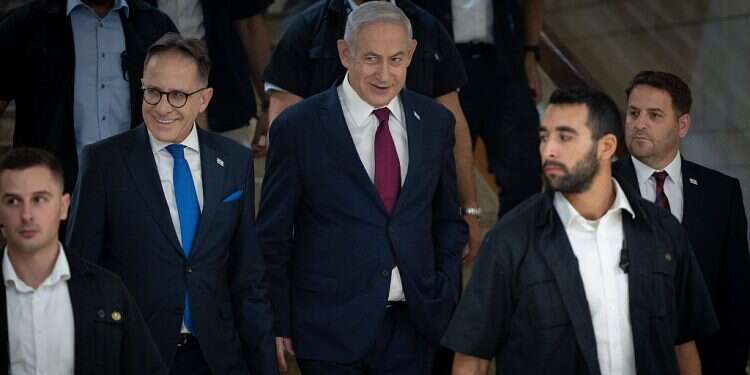Israeli lawmakers' scheduled vote on two members of the Judicial Selection Committee has caused a political crisis after Prime Minister Benjamin Netanyahu and Likud proposed to have MKs forgo voting for the next month and said all Coalition candidates for the secret ballot should be withdrawn and that if the vote is held – to oppose all candidates that would remain.
Eventually, after hours in which it appeared that the vote might be scrapped altogether, the secret ballots were counted and to the surprise of many, the Opposition won a seat on the committee – which determines which justices get appointed – thanks to defections from Netanyahu's governing Coalition. The second open seat on the panel did not get the necessary quorum, and therefore the Knesset will have another vote in a month's time.
The victory for the Opposition, which saw Yesh Atid MK Karine Elharrar get the lucrative spot and potentially help derail the judicial reform advanced by Netanyahu's government, put off another potential clash over the overhaul of the justice system, which has torn Israel apart over the past several months. This was made possible thanks to Netanyahu's allies essentially defecting in the secret ballot and defying his wish to boycott the candidates and force a delay on filling the two seats.
Earlier, Opposition leaders were outraged over the Likud proposal to delay the vote on both seats, saying this was political trickery. "Those who try to do maneuvers in this process will hurt the State of Israel and Israelis. The committee makeup has to be determined today, with an Opposition member on it," the Opposition said, warning that the reconciliation talks on the contested judicial reform could be derailed if the vote is delayed, as this would deny the Opposition a chance to secure a spot on the committee.
The crucial vote next month could give a clear signal as to how far Netanyahu's coalition government is prepared to compromise over the judicial reform he has pursued.
Follow Israel Hayom on Facebook, Twitter, and Instagram
The nine-member committee that appoints judges, including to the Supreme Court, has been the hottest issue in the battle over the nationalist-religious government's judicial overhaul plan, which has sparked nationwide protests.
Netanyahu has suspended the overhaul plan, which gives his coalition almost complete control of appointments to the bench. He has been holding compromise talks with the Opposition that aim for broadly agreed legal reforms instead. But if parliament excludes the Opposition from the two members it picks on Wednesday, those talks are likely to be scuppered.
The panel is now made up of lawmakers, ministers, judges, and lawyers. In the past, it has been traditional for the two members named by the Knesset to represent the coalition and opposition, but hardliners want both to represent the government.
The judicial drive, announced in January only a week into Netanyahu's return to office, set off one of Israel's worst political crises in years, with critics at home and abroad dubbing it a threat to the very nature of Israel's democracy.
Advocates of the proposed overhaul say the Supreme Court is elitist, left-leaning, and overreaching, and elected officials should have more power in picking the bench. Critics say that would politicize the courts and threaten judicial independence.
Western allies, including Washington, have urged Netanyahu to pursue broad consensus over reforms to the justice system. Until now, talks with the Opposition have yielded little, compounding uncertainty over the overhaul plan's future that has hit the economy and the shekel. The stakes are rising with two Supreme Court judges retiring in the coming months.
Subscribe to Israel Hayom's daily newsletter and never miss our top stories!




